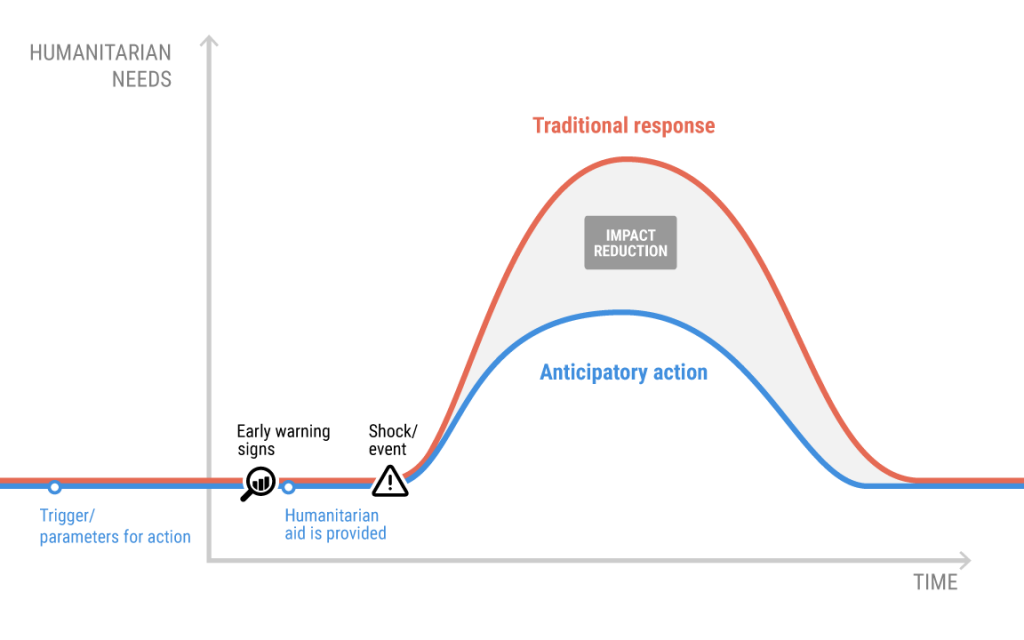What is anticipatory action?
Anticipatory action enables humanitarian organizations to get ahead of a shock and mitigate its impact on vulnerable people. Predictive analytics can help anticipate humanitarian needs arising from different shocks. This opens a window of opportunity allowing humanitarians to reduce the overall impact of shocks by acting before needs materialise. Emerging evidence shows that anticipatory action is a more dignified, rapid, and (cost-) effective humanitarian response.

The role of the Centre
The Centre provides support to OCHA and partners to develop the mechanisms that trigger OCHA’s Anticipatory Action Frameworks. The Centre conducts historical analysis, assesses available models and forecasts, and designs trigger mechanisms for anticipatory action. It also acts as a technical translator, ensuring effective communication between modelers and forecast producers, and humanitarian decision makers.
“Through our Centre for Humanitarian Data, OCHA is providing technical expertise to assess forecasts, validate models, and then design trigger mechanisms for Anticipatory Action frameworks. This is detailed technical work and this is one of the areas in which we must invest efforts and indeed at OCHA we are seeking to do so.”
-Martin Griffiths, USG for Humanitarian Affairs and ERC
Current OCHA frameworks
Shock seasons
Additional resources
By Country
- Centre for Humanitarian Data impact story (Jul 2020)
- Framework summary
- Model Report: Flood Anticipatory Action Trigger (June 2023)
- CERF allocation 2020
- Activation announcement (Jul 2020)
- Activation summary (Jul 2020)
- Allocation report (Oct 2020)
- Learning and evaluation
- Process learning: Report by Centre for Disaster Protection (Sep 2020)
- Impact evaluation: Beneficiaries survey report by 60 Decibels (Feb 2021)
- Impact evaluation: Interim findings by Centre for Disaster Protection and Oxford University (Feb 2021)
- Impact evaluation: Cash transfers report by Centre for Disaster Protection (Apr 2021)
- Framework summary
- Model Report: Drought Anticipatory Action Trigger (December 2022)
- Framework summary
- Model Report: Trigger for Anticipatory Action on Drought (June 2023)
- Framework summary
- Technical resources
- Dry spells analysis: Technical note (January 2022)
- Dry spells trigger: Lessons learned (June 2021)
- Dry spells dataset: Historical events in Malawi
- Learning and evaluation
- Process learning: Report by Centre for Disaster Protection
- Trigger evaluation: Report by UK Government Actuary Department & Centre for Disaster Protection
- Framework summary
- Model Report: Flood Anticipatory Action Trigger (June 2023)
- Centre for Humanitarian Data blog on triggering anticipatory action for floods in Nepal (June 2023)
- Impact story: Lessons from Anticipatory Action in Niger 2022 (June 2024)
- Framework summary
- Model Report: Drought Anticipatory Action Trigger (January 2023)
- Framework Summary
- CERF allocations
- 2021: Activation announcement (Apr 2021)
- 2020: Activation announcement (June 2020)
- 2020: Allocation report (Feb 2021)
- Learning and evaluation
- Process learning: Report by Centre Disaster Protection (Oct 2021)
- Centre for Humanitarian Data impact story: Lessons from the 2022 South Sudan Floods (January 2024)
- Framework summary
- Centre for Humanitarian Data blog on flood risk for South Sudan’s 2022 rainy season (May 2022)
- Framework summary
- Model Report: 510 Typhoon Impact Model (August 2022)
- Centre for Humanitarian Data peer review blog (October 2022)